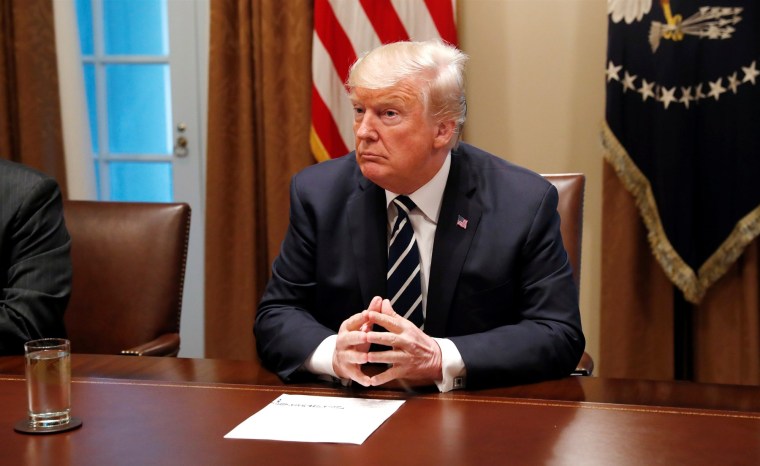During the Republican Party's presidential nominating contest a few years ago, several GOP candidates announced their opposition to birthright citizenship: the Fourteenth Amendment's guarantee that people born in the United States are American citizens. Leading the way was Donald Trump, who announced his opposition to the constitutional principle in 2015.
Evidently, he hasn't forgotten about it.
Trump, in an interview with Axios, part of which aired Tuesday morning, said birthright citizenship "has to end" and that it would, "with an executive order.""We're the only country in the world where a person comes in, has a baby, and the baby is essentially a citizen of the United States for 85 years with all of those benefits," Trump said. "It's ridiculous. It's ridiculous. And it has to end.""It's in the process. It'll happen with an executive order," he said, adding that he's consulted with the White House counsel on the matter.... "It was always told to me that you needed a constitutional amendment. Guess what? You don't," Trump said. "You can definitely do it with an act of Congress. But now they're saying I can do it just with an executive order."
Ordinarily, this would be the point at which I'd start fact-checking. I'd note that the United States is not "the only country in the world" with birthright citizenship, since dozens of other countries, including our neighbors to the north and south, have the same policy. I'd explain that the idea of a president rewriting the Constitution through executive fiat is insane. I'd mock Republicans -- including Trump -- for chastising Barack Obama's reliance executive actions as dictatorial, while shrugging their collective shoulders as his GOP successor adopts a far more abusive posture.
But in this case, let's go in a different direction. First, just because Donald Trump says he'll sign an executive order is no reason to believe he's going to sign an executive order. The president says all kinds of things, many of which bear no relationship to reality. When it comes to the White House's efforts -- in the past, present, or future -- Trump is an alarmingly unreliable narrator. To take his words at face value is folly.
Second, even if Trump were to seriously pursue such an approach, there's no reason to believe the courts would go along with such radicalism. Republicans may be under the impression that Brett Kavanaugh will allow this president to do as he pleases, but there are lines Trump can't cross. This would almost certainly be one of them.
But even if we put all of that aside, it's important for political observers to recognize this for what it is: an outlandish election-season stunt intended to shift the conversation onto the issue Trump wants to talk about.
Treating the president's comments as anything but a public-relations gambit would be a mistake.
That's not to say Trump's vow is trivia. I think his bluster on birthright citizenship matters in the same way the White House budget matters: it's not about what's going to happen; it's about what Trump wants to see happen.
And in this case, what the president sees as ideal is the ability to take unilateral action to rewrite constitutional law in an anti-immigrant way. Stunt or no stunt, that's a posture worth remembering.
